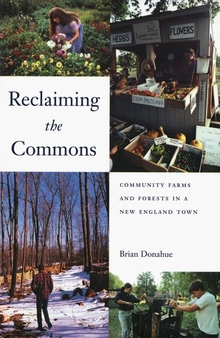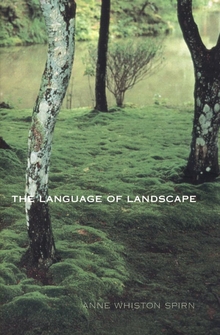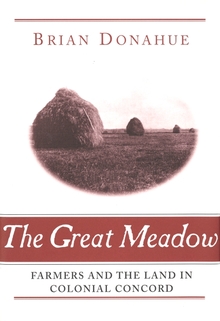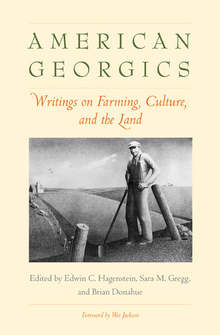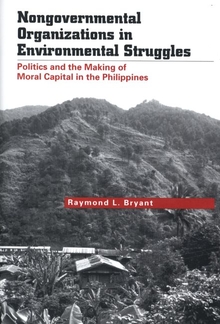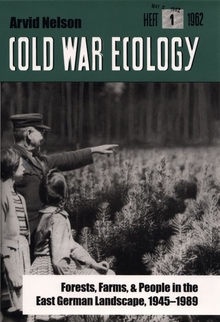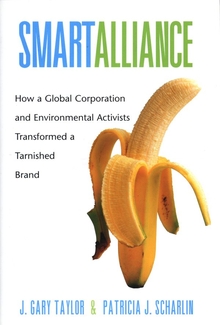Reclaiming the Commons
WARNING
You are viewing an older version of the Yalebooks website. Please visit out new website with more updated information and a better user experience: https://www.yalebooks.com
Community Farms and Forests in a New England Town
Brian Donahue; Foreword by Wes Jackson
Brian Donahue, an environmental historian, in 1980 was a founder of Land’s Sake, a community farm in Weston, Massachusetts. Working with the town’s Conservation Commission, Land’s Sake cultivates a twenty-five-acre organic fruit, flower, and vegetable farm, makes apple cider and maple syrup, maintains a sixty-five-mile trail system, harvests firewood and timber from fifteen hundred acres of town forest, and has kept draft horses and sheep. Donahue recounts the joys and sorrows of farming the suburbs. But beneath the light hearted tales of sheep straying into tennis courts and middle-school students tapping sugar maples in the town cemetery runs an incisive ecological history of New England and a penetrating analysis of how to live responsibly with this difficult but rewarding land. Donahue concludes with a call for all places to protect common land and establish community farms—especially in the suburbs, where most Americans live and where, like it or not, environmentalists may make their most lasting mark on the world.
"This book rescues ’wise use’ of the environment from moral impoverishment and presents a compelling vision of how to reintegrate people into nature. It is forward-looking, practical-minded, and consistently wise. No better manual exists for getting a suburban nation out of its cars and back on the land."—Donald Worster, Hall Distinguished Professor of American History, University of Kansas
"This is a well-observed journey from a spiritually-based environmentalism to a more pragmatic sustainability. I recommend it for those who love the earth and want a practical guide for how to save it."—Howard Dean, M.D., Governor of Vermont
"Reclaiming the Commons is a timely, eloquent book. Brian Donahue, by focusing lovingly yet unsentimentally on his own town of Weston, Massachusetts, addresses a question that is equally urgent in many other locales. How can residents of our expanding suburbs encounter the agricultural countryside in a more mindful, mutually enriching way? He illuminates the constructive possibilities through a sequence of remarkably perceptive and engaging personal narratives."—John Elder, Professor of English and Environmental Studies at Middlebury College and author of Reading the Mountains of Home
"This is an extremely useful book on community economy. It seems to me not at all to oversimplify the subject, and yet it is always clear. It applies good sense to problems that people often have felt much about without thinking or knowing much about. It is well-written and thoroughly readable."—Wendell Berry
"Donahue correctly identifies America’s suburbs as the necessary and logical place to preserve and promote healthy, productive, and aesthetically rich landscapes. The book is at once wise, practical, and hopeful."—William Vitek, coeditor of Rooted in the Land
“Here’s a handbook for people living in America’s suburbs who want to protect and sustain their communities’ natural landscapes. . . . This is a tale of good philosophy being sound in practice.”—Carl Reidel, American Forests
“This is a commonsense book with a lot of practical detail about how to make our suburbs more sustainable. But beneath all the rustic charm about cider pressing, lamb shearing, and flower growing, Donahue presents a radical argument for refashioning the pattern of land use and land ownership in America so that we can preserve the rural character of the landscape and create a more sustainable agricultural system.”—Steve Lerner, Amicus Journal
"Donahue combines social and natural history to examine how our culture and economy favor development and consumerism at the expense of the environment. . . . An engaging look at environment issues and what can be done beyond handwringing."—Vanessa Bush, Booklist
“In Reclaiming the Commons; Community Farms and Forests in a New England Town, Brian Donahue describes the laborious process by which Land’s Sake, a 25-acre organic fruit, flower and vegetable farm was brought into existence in 1980 in the heart of suburban Weston. It’s a veritable how-to guide for those who feel a need to improve the landscape beyond their front yard.”—David Warsh, Boston Sunday Globe
“Everyone should read this book. . . . The book is many things: an ecological history of New England, a how-to of community farming in an ecological history of New England, a how-to of community farming in the suburbs, an engaging journal on trial-and error environmentalism, and a call for suburban sustainability. Enjoyable, stimulating reading for general readers, professional environmentalists, and everyone in between.”—Choice
“Donahue’s personal narrative attempts to motivate suburbanites to action. He weaves his own experiences with rich history, current environmental concerns and relevant literary parallels to create both a practical resource and a captivating narrative that follows the four “E’s” through-out: Ecology, Economy, Education and Esthetics.”—E Magazine
“This well-written and often inspiring book addresses some serious questions to a generation divorced from the countryside who see food only in tins and packets and have forgotten how it is produced. . . . This book is an indictment both of the unregulated expansion of affluent but rootless suburbs, where public open space is retained as little more than a token, and of modern industrialised food production, dependent upon chemical fertilisers and pesticides, cheap energy and transport, achieved at great ecological cost and ultimately unsustainable. Yet it also offers a more optimistic vision, based not upon wooly-minded idealism but on practical experience.”—Landscape History
"[Donahue’s] ideas on how to and especially how not to go about community farming represent hard-won knowledge, and his suggestions on getting children involved as a way to connect with the land and with the community are especially poignant. The result is a lush and persuasive narrative that makes even lambing in the middle of a cold spring night seem charming. Highly recommended for all public and academic libraries."—Library Journal (Starred review)
“To Donahue, the environment is the place we inhibit, not a wilderness getaway remote in the mountains. His delightful book provides counsel on developing a responsible, functional connection with nature.”—New Connections
"Donahue’s book is more than a theoretical treatise. He shoveled manure, sheared sheep and boiled maple syrup; the book has the smell of moist earth. . . . [Donahue’s] aim is to encourage a land ethic that will lead naturally to a desire to protect more remote areas as havens of endangered species and biological diversity. It’s difficult to know whether his proposals for productive use of suburban land can endanger that kind of land ethic. But his case that we should try to reconnect with the land is made more powerful because, in one town, he has shown it can work."—Paul Raeburn, New York Times Book Review
"[A] grassroots, dirt-under-the-fingernails autobiography . . . interwoven with an ecohistory of New England. . . . His radically conservative manifesto offers new approaches to make suburbia economically healthy, more livable and ecologically balanced."—Publishers Weekly
"A wonderful addition to the literature of urban and small-scale farming by Gene Logsdon, Michael Ableman, and Wendell Berry, the book maps out the possibilities for a greening of the suburbs."—Bob Schildgen, Sierra
"Brian Donahue has discovered good reasons for ecological hope in the belly of the beast. Reclaiming the Commons is not just a thoughtfully told story of one town caught up in sprawl, it is an authentic blueprint for what suburbs everywhere might yet become with a bit of imagination and good work. No one has offered a better vision. Read it and insist that your city council members and county commissioners do as well!"—David Orr, Oberlin College, author of Earth in Mind
Publication Date: March 11, 2001
16 b/w illus.

